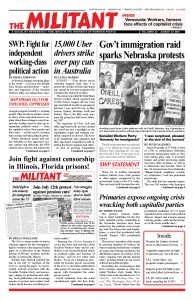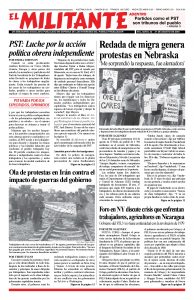In a blatant attack on democratic rights and an individual’s right to privacy, the Transportation Security Administration has been running a secret spy program targeting thousands of passengers on U.S. domestic flights.
The existence of this “Quiet Skies” surveillance program, which has been in operation since 2010, was revealed in a July 28 Boston Globe exposé.
Teams of federal air marshals are deployed to collect extensive information and file reports on those they target — who haven’t been accused of any crime. And when they are assigned to fly with you, what are the “suspicious actions” the snoops are told to look for? Do you sweat heavily, have a “cold, penetrating stare,” fidget, use a computer, use the bathroom too much, sleep on the plane, change clothes or chat with other passengers.
“This program raises a whole host of civil liberties and profiling concerns,” Faiza Patel, co-director of the New York University School of Law’s Brennan Center for Justice, told the media. The American Civil Liberties Union demanded July 30 that the TSA provide more information on the program.
Quiet Skies, according to a TSA internal bulletin, is “based on analysis of terrorist travel trends, tradecraft and associations,” and is implemented against those who are “possibly affiliated with Watch listed suspects.” So you’re targeted if you fit some computer-generated “trend.” Or for your “associations.” Who decides who and why? Targets aren’t notified when they’re placed on the list.
The secret “Watch” list is the TSA’s no-fly list, and it seems you get targeted if you know someone who’s on it. But it’s secret, so you don’t know. Most likely they don’t either. The list has grown from some 16 people in September 2001, around the time the TSA was formed, to 64,000 in 2014. If you’re on the list you can be prevented from flying or get special attention and interrogation at the airport. And there’s no way for you to get off it.
All U.S. citizens who enter the country are automatically screened for inclusion in Quiet Skies — their travel patterns and affiliations are checked and their names run against TSA databases, according to agency documents the Globe got.
Even some air marshals assigned to tail targets and file reports of what their spying discovered have questions about this program. “In late May, an air marshal complained to colleagues about having just surveilled a working Southwest Airlines flight attendant as part of a Quiet Skies mission,” reported the Globe. “‘Cannot make this up,’ the air marshal wrote in a message.”
In a related development, a federal court ruled July 11 that TSA agents are above the law. When they work at airport checkpoints, no matter whatever they do, they can’t be sued over allegations of abuse. The judge ruled that TSA screeners, despite their badges and titles as “officers,” do not qualify as “law enforcement officers.” Instead, the court ruled, they are government employees endowed with sovereign immunity against being sued.
The case arises over a suit filed nearly 12 years ago by Nadine Pellegrino when she complained over harassment and abuse from TSA officials at the airport checkpoint in Philadelphia. After three pieces of her luggage passed through a metal detector, a male TSA officer said she had to step aside for additional screening. But his “rude” demeanor and handling of her bags led her to ask for a private search, her complaint says.
Three female TSA officers then conducted an intrusive pat-down search in a tiny room. “Besides being frisked and swabbed for possible explosives,” Pellegrino told the Washington Post, one of the TSA agents “looked at her cellphone data, delved into library and credit cards, examined private papers” and spilled some of her toiletries in her luggage, “breaking a zipper, breaking eyeglasses and damaging her jewelry.”
As the conflict accelerated, the police were called and threw her in jail for 18 hours on 10 charges for allegedly assaulting two TSA agents. It took her two years and a wad of money to get acquitted. The court ruling says that while she might be right, there’s nothing she can do about it. The TSA simply never has to answer for harassment or abuse.

